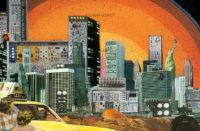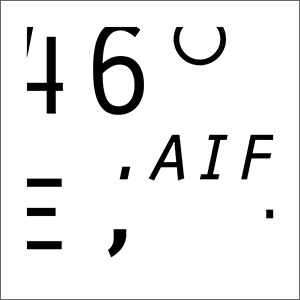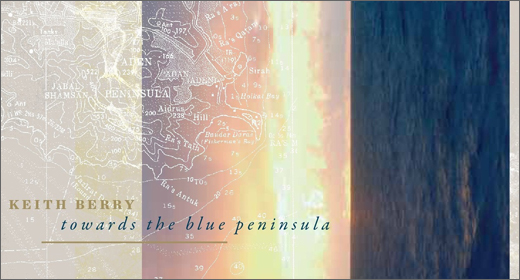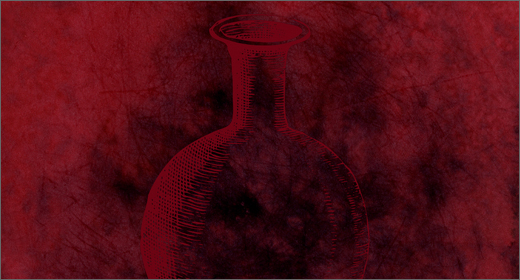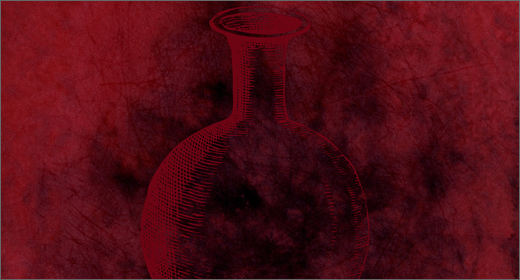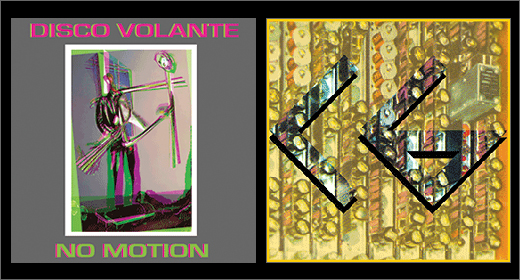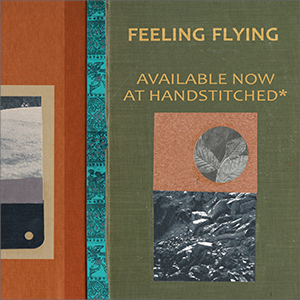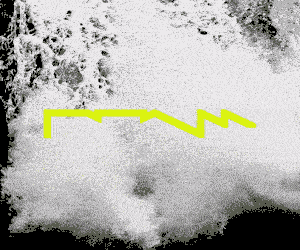For some years now Infraction Records has been doing us proud with a series of reissues of obscure objects of desire – some limited editions where demand left supply high and dry, others reclaimed from a limbo fallen into perhaps out of insufficient initial release momentum.
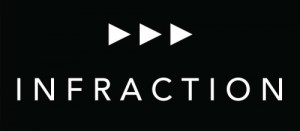 For some years now Infraction Records has been doing us proud with a series of reissues of obscure objects of desire – some limited editions where demand left supply high and dry, others reclaimed from a limbo fallen into perhaps out of insufficient initial release momentum. Tetsu Inoue’s World Receiver, Aloof Proof’s Piano Text, Parks’ Umber and Beequeen’s Music For The Head Ballet all variously fit the aforementioned bill. Now come two more: originally released in 2005 on Crouton, Keith Berry‘s The Ear That Was Sold to a Fish was limited to 300 copies, packaged indulgently in a small box filled with leaves accompanied by poems, and quickly sold out; the first coming of Jeremy Bible & Jason Henry‘s Vryashn was as a lowly Gears of Sand cd-r in 2008, where it became something of an overnight ambient mini-sensation, paltry numbers flying off GoS’s shelves, leaving the cupboard bare for latecomers. Here both get the treatment: a remaster of The Ear, plus a second album of previously unreleased material, Turn Right A Thousand Feet From Here, while Vryashn gets a vinyl makeover, with a bonus download. More follows…
For some years now Infraction Records has been doing us proud with a series of reissues of obscure objects of desire – some limited editions where demand left supply high and dry, others reclaimed from a limbo fallen into perhaps out of insufficient initial release momentum. Tetsu Inoue’s World Receiver, Aloof Proof’s Piano Text, Parks’ Umber and Beequeen’s Music For The Head Ballet all variously fit the aforementioned bill. Now come two more: originally released in 2005 on Crouton, Keith Berry‘s The Ear That Was Sold to a Fish was limited to 300 copies, packaged indulgently in a small box filled with leaves accompanied by poems, and quickly sold out; the first coming of Jeremy Bible & Jason Henry‘s Vryashn was as a lowly Gears of Sand cd-r in 2008, where it became something of an overnight ambient mini-sensation, paltry numbers flying off GoS’s shelves, leaving the cupboard bare for latecomers. Here both get the treatment: a remaster of The Ear, plus a second album of previously unreleased material, Turn Right A Thousand Feet From Here, while Vryashn gets a vinyl makeover, with a bonus download. More follows…
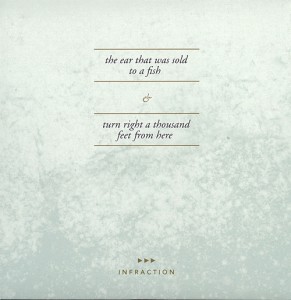
Keith Berry is an artist with ambitions beyond the ordinary, seeking “to plant a little seed in the listener that given the right conditions could grow into something far bigger than the work itself,” further articulating his ethos in quasi-spiritual terms: to “…work with blocks of sound in the same way a zen koan might work, in the sense that these “blocks” are supposed to be “triggers,” which, though they do not contain enough information in themselves to impart enlightenment, may possibly be sufficient to unlock the mechanisms inside one’s mind that leads to enlightenment.” Berry’s conceptualization has interesting linkages with affordance theory, where music is cast as a kind of sonic prosthetic for personal world making, music’s customary focus shifting from what it presumes to depict or say about the world to the worlds it makes possible. No fly-by-night mouse-click trick turner, then, Berry has steeped himself liberally in Western Thought (viz. Huxley, Castaneda, Nietzsche), Eastern philosophy (Wabi-Sabi, Zen, the I Ching), and the Sufi poets (Hafiz, Rumi) – just some of those whose ideas purportedly inform his artistic practice. Berry’s oddball title in fact derives from Hafiz, who writes of “a boy who couldn’t travel far so in his mind sells his ear to a fish and his eye to a bird.” Musically, though, it’s Akira Rabelais’s Argeïphontes Lyre & Recalcitrance programmes that are the stars; Rabelais’ ware is everywhere in The Ear‘s eerie air, giving new voice to captures from recorded sources (apparently including Les Baxter’s Exotica), tweaking a chair creak or twirling a bicycle wheel into spatial and glacial.
The suite sets out somewhere in a zone of liminal noise, proceeding, delicate, deliberate, each movement formed of a drone-drift-wash backdrop against which small acts incide – a flicker, a whisper, a remote rumble; a soft teeming of mandible chatter, insectoid scuttle, later traces of – what’s this? – strings and a piano. The hisses and crackles, and sudden lacunae are choreographed into pared back sound art vignettes which afford any number of images, metaphors, and ideas. The whole unfolds with a cadence akin to floating gently eyes-closed down a nightime river (Berry’s own analogy). Earlier release history has led to Berry being grouped along with the lowercase likes of Bernard Günter and Steve Roden. And the minimalism of Morton Feldman is often invoked as a presiding deity. But Berry largely eschews the more austere ends of microsound and minimalism in favour of subtle development and textural richness. Minimal in not making a fuss for attention, his relative fulsomeness of expression actually shows more of an affinity with the North-West Drone-lodge of Ora, Mirror, Monos, of Chalk and Coleclough, of Potter, Tate and Bradley. Minimal in means, Berry takes a pinch or an inch, then expands, taking pains over frequency range and emplacement. Recursive strategies are deployed – parts assembled and reassembled, revenants in subtly altered states, new acquisitions and mergers forming a perpetually evolving internal structure. “Cars Keep Passing By,” for example, resurrects part of “The Sun Rays of Another Pale Afternoon”, subtly elaborating in timbral glimmers whispering something like melody. And, to clinch what’s already a done deal, the accompanying unreleased LP is just as good, as evidenced by “It Might Be Better To Fail With Land In Sight” (audio clip here).
Like Rock, Drone is an area periodically pronounced dead by would-be arbiters of genre currency. Keith Berry’s The Ear That Was Sold to a Fish is one of those albums whose inner life and fertility is compelling evidence that Drone is not only alive, but with designs on immortality. The artful construction and architecture of this post-minimal space drone suite shows how spare means can be harnessed to rich ends, making it one of the most engrossing records of the year – whether 2011 or 2005.
[soundcloud url=”http://api.soundcloud.com/tracks/13318935″ params=”show_comments=true&auto_play=false&color=1e81c4″ width=”100%” height=”81″ ]
::….:.:::….:::::::..:::::…..::..::::…::::.:.::::..:::…:::….:::.::::.:.::.:::.:::.:::…:::..::…::
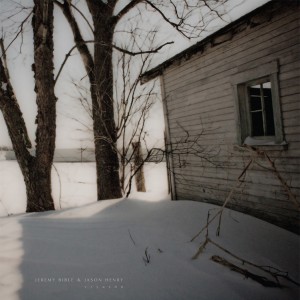
Not yet at the The Ear‘s level of stone cold cult classic, but similarly sought after or seek-worthy – out of oversubscription or neglect – is Jeremy Bible & Jason Henry’s Vryashn. Infraction’s reissue strategy affords these fellow dwellers in Ohio ambience not just a renewed platform, with Vryashn revisited here for a deluxe vinyl reissue, but a revitalizing visual refresh with some gorgeously bleak evocative large-format (what a pleasure!) artwork – an eye-feast fit for the internal ear-fest. Vinyl, yes – and not only 400 on white, but 100 on baby blue (ooh!), plus the bonus of a download code for an expanded version mastered by mastering man-of-the-moment, Taylor Deupree.
The contents, conveyed when placed on graceful turntable, find Bible and trusty sidekick Henry stewards of a veritable flotilla of sources manipulated to produce soundings that are as upwellings from the deep. Their theme is of a dream within a dream – of being snowbound (see cover!), becoming numb and falling asleep, awaking in the rain (hear disc!) only to find yourself in another dream and location. The twosome get you traveling without moving with a pair of sweeping suites; these are presented – though never wholly revealed, obscured as they are by shifting clouds of layers, oneiric scenes sonically projected in Bible black and other hues of Henry’s choosing. Vryashn – presumably, so-called for its concept of reduced variation – is diversely, esoterically, rendered via water line pipes, wine glasses, rain on a window, and a garage lamp, a concession to convention in the liberal deployment of a piano, albeit a heavily waterlogged one. Not one for purist ambient piano-philes, who can bid bye-bye to Budd baths, their beloved, variously immersed, fragmented and re-moulded. There’s something of the eternal in it, but no Lamonte Young theatre, this piano not so much well-tuned as well-treated – ending up adrift near riskier reefs where you might catch sight of Aloof Proof’s The Ghost Ship, or even a glimpse of Andrew Liles’ Dying Submariner.
“Vryashn1” begins a descent into a drowned world, creeping around at the edges of the liminal, sparse piano notes with attack subtracted and sustain-release increased, as if exploring the extent of the sound envelope’s timbral stretch; the trilling piano figures trail flurries of delay-returns across shifting texture plates, welling up slowly in sonorous waves all a-flicker with field captures. Tension builds till a third of the way in when the piano strings get a direct hit, eddying out into arcs of echoing endlessnessism. Initially seeming noisier, “Vryashn2” is merely prey to more – and more diverse – depradations of a digital kind. A similar feeling of unmoored oceanism to its predecessor emerges, ranging from a New Age ripple to a post-industrial torrent, moods from elegiac to displaced. Throughout Bible & Henry fuse a variety of elements in seeking synergies between found sound and musique concrète, acoustic instrumentation and electronic sound design. Not a ground-breaking strategy these days, to be fair, but in the warmth and spacious motions of Vrashyn‘s reverberant Satie-ation Bible & Henry display an architectural prowess that sets them apart from the lonely drone herd.
[soundcloud url=”http://api.soundcloud.com/tracks/11670603″ params=”show_comments=true&auto_play=false&color=1e81c4″ width=”100%” height=”81″ ]
::….:.:::….:::::::..:::::…..::..::::…::::.:.::::..:::…:::….:::.::::.:.::.:::.:::.:::…:::..::…::
Both releases are out now on Infraction Records.






